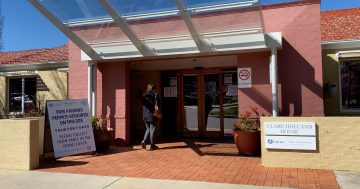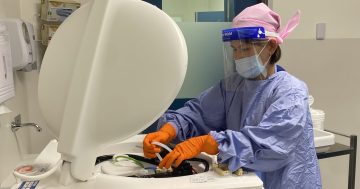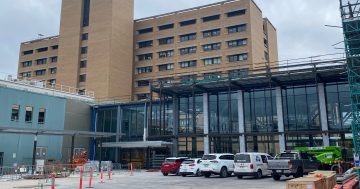
The clinical director of the intensive care unit at Canberra Hospital, Dr Bronwyn Avard, has launched legal action against Canberra Health Services. Photo: Supplied.
A director of Canberra Hospital’s intensive care unit (ICU) is suing the city’s health service, accusing it of breaking the law after she raised allegations of safety risks to patients and staff.
Dr Bronwyn Avard began working at the hospital in 2004, rising to become clinical director for its ICU in 2015.
On Wednesday (13 July), she lodged documents in the Federal Court of Australia naming the ACT and two hospital executives as respondents.
She claimed the Fair Work Act 2009 was breached when action was taken against her, which amounted to attempting to silence a whistleblower.
Dr Avard claimed she raised workplace health and safety issues with hospital executives over several years and the action only started against her after she raised such concerns.
According to court documents, she made formal complaints about four alleged incidents in late 2021, including one “identifying mental stress by reason of work-related harassment and/or workplace bullying”.
“I have devoted the past 17 years to the well-being of patients and staff in Canberra Hospital and I remain fully committed to public health care in the ACT,” Dr Avard said.
“I am shocked and dismayed that the hospital system is so resistant to suggestions as to how to improve its service, and in doing so, it is failing to meet basic statutory obligations in relation to health and safety.
“This personal attack on me by my employer has left me no choice but to defend my integrity and shine a light on the shortcomings in the system in the hope that things will improve for the safety of patients and staff.”
She is seeking an acknowledgement that Canberra Health Services (CHS) did contravene the Fair Work Act and payment for losses incurred since the actions began against her in late 2021, alleging she had lost income, and been humiliated, and her professional reputation had been damaged.
Among actions taken against Dr Avard, earlier this year, the CHS told her concerns had been raised about her performance and a clinical misconduct investigation would begin, during which she would be suspended.
In July, the investigation was closed due to a lack of evidence. Dr Avard rejects being involved in any misconduct.
A CHS spokesperson said the CHS would not be commenting on matters before the court or individual employees.
“We acknowledge there have been some culture issues identified within the ICU,” the spokesperson said.
“We have a leadership team in place who are working to implement strategies to improve culture within the unit.”
But the spokesperson wanted to assure Canberrans and those in the surrounding region that the ICU is well-staffed and delivers quality, safe health care.
“This has been externally validated by the recent accreditation survey for Canberra Health Services, which found we met all National Safety and Quality Health Service (NSQHS) Standards,” they said.
“Additionally, CHS has undergone a verification of trauma services, including our intensive care unit, by the Royal Australasian College of Surgeons – Trauma Verification Team.
“The feedback from the team of external specialist doctors was very complimentary (we await the final report).”
But it is not the first time troubling allegations about the ACT’s public health system have surfaced.
A damning 2019 report on staff culture in the Territory’s public health system found 12 per cent of staff had been subject to physical harm, sexual harassment or abuse, and more than half of these incidents were perpetrated by a colleague.
The latest annual review, which was made public last November, found little had changed regarding bullying at CHS.
CHS CEO Dave Peffer said that anyone – no matter how senior their role – who was consistently demonstrating poor behaviour would be shown the door in the coming months.
In December last year, Mr Peffer revealed a later workplace culture survey at CHS had returned the best results in 15 years, with reports of bullying down 15 per cent.
But he said there was zero tolerance for bullying and confirmed some staff members had already been shown the door, with more likely to follow.
Several of the recommendations made in the 2019 report had yet to be implemented at the latest review point and the government has come under fire for this.
It has previously blamed the pandemic for delays.





















